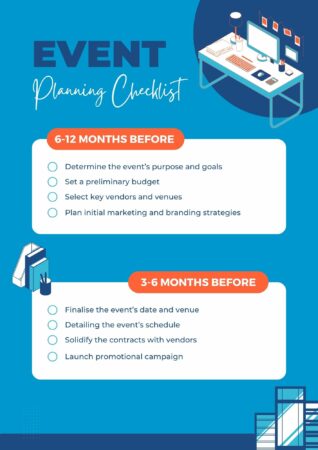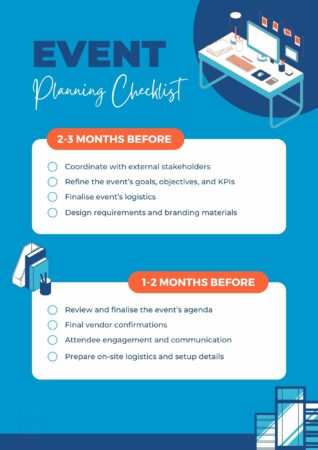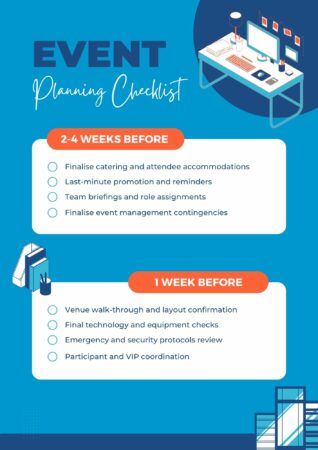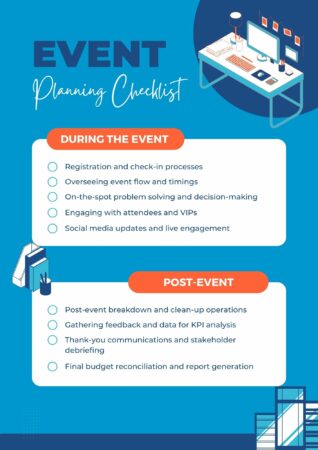Your Comprehensive Event Planning Checklist Guide
Embarking on the journey of organising an event can feel like navigating a maze—exciting but full of unexpected turns. That’s where a vigorous event planning checklist becomes your life-saving compass!
This guide isn’t just about a to-do list; it’s your strategic partner in carving out a successful event from the ground up.
The essence of a thorough event management checklist lies in its ability to adapt to your needs. To put it simply, it’s a document that’ll help breathe life into your event’s vision, ensuring that each component harmoniously aligns with your event goals.
So, let’s begin this journey with a comprehensive event checklist that is as dynamic and ambitious as your event deserves to be.
The role of timely preparation in event planning

As the event manager, you should understand that an event planning checklist should be the timeline of your event planner, whereby each item brings you a step closer to the event of the year. An effective event checklist is rooted deeply in the timely orchestration of countless details.
It’s the early bird approach to securing the perfect venue, engaging with reliable vendors, and crafting a promotion strategy that can set the stage for an exceptional event.
As we unfurl the event planning checklist, remember that each timely planning process is a strategic step towards the seamless realisation of your event.
6-12 months before the event: Laying the groundwork
The initial phases of your event planning journey are the foundation of the success of your event. Here’s how to establish a solid foundation.
Step 1: Determining the Event’s Purpose and Goals
Define clear objectives
What are you aiming to achieve with this event? Whether it’s to raise funds, increase brand awareness, or build a community; pinpointing your event goals sets the stage.
Identify target audience
Who will be attending your event? Understanding your target audience ensures that every decision event planners make caters to their expectations and preferences.
Step 2: Setting a Preliminary Budget

Outline financial limits
Establish clear boundaries for your event budget to avoid spending too much and prevent any future financial strain for the event.
Anticipate hidden costs
Always allocate a portion of the event budget for unforeseen expenses such as contingency funds, vendor and venue specifics, market fluctuations, and incidentals.
Step 3: Selecting Key Vendors and Venues

Venue scouting
When looking for venues or locations for your event, look for places that align with your event’s theme and size. It’s advisable to book early as well so that you can secure the venue on your preferred date.
Vendor evaluation
During this phase, you can start conversations with caterers, decorators, event tech, and suppliers. Through this effort, you can find the best fit for your event budget and gain quality expectations from the vendors.
Step 4: Initial Marketing and Branding Strategies
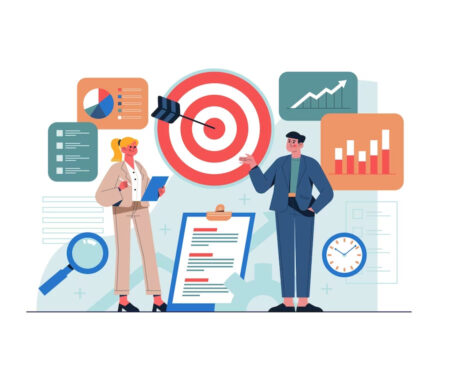
Brand your event
Develop a unique theme or brand for your event to make it stand out and be instantly recognisable.
Marketing plan
Craft an event marketing strategy that includes the timeline of execution, platforms that will be used, and content creation to build anticipation and increase registrations among your target audience.
3-6 months before the event: Strategic planning phase
In this middle phase, this is where you begin turning your foundation into a tangible blueprint. Keep ticking off these critical tasks on your event planning checklist to ensure you’re on track.
Step 5: Finalising the Event’s Date and Venue
Confirm date and venue
Lock in the dates for your event and ensure that the venue contract is signed. This confirmation is important to the following steps of the event checklist.
Venue logistics
Start planning the layout of the event space; consider the flow of the event, capacity, and any special accommodations for accessibility.
Step 6: Detailing the Event’s Schedule
Program development
Draft a detailed schedule that includes all the sessions of your event, including breaks and networking sessions. When planning an event, timing is everything; so ensure it is logical and attendee-friendly.
Speaker lineup
Begin confirming event speakers or performers, and during this time, ensure their time slots fit within the broader agenda.
Step 7: Solidifying Contracts with Vendors

Vendor commitment
Confirm and sign contracts will all the critical vendors, from caterers to AV technicians so that you can secure their services for your event.
Ordering equipment and supplies
Place the orders for any necessary equipment and materials that will be needed for your event. This includes types of equipment and materials that need to be custom-made or pre-ordered.
Step 8: Launching Promotional Campaign
Marketing kick-off
If you haven’t already, now is the perfect time to launch your event’s promotional campaign. Utilise all platforms of social media, email newsletters, and any other kinds of platforms to spread the word about your event. Create an event website for early bird registration, leveraging its capabilities to track attendee interest and gather preliminary data for logistical planning.
Sponsor outreach
Secure sponsors and partners, if applicable, and integrate them into your marketing and event materials.
2-3 months before the event: Execution ramp-up
With the event’s date drawing closer, this phase of your event planning process now focuses on fine-tuning the details and ensuring that all systems are ready to go.
This is a critical stage for the pre-event planning management checklist where coordination and attention to detail take center stage.
Step 9: Coordinating with External Stakeholders
Stakeholder updates
Regularly update stakeholders on the progress of your event, incorporating their feedback on the event as well.
Permits and licenses
Ensure that all of the necessary permits, insurance, and legal requirements are in place to avoid any last-minute hiccups during your event.
Building essential documents for team coordination
- Event Manual
Compile a comprehensive event manual or playbook that details every aspect of the event for the event team members.
- Vendor contact sheets
Create a master list of all of the vendor contacts, including backup contacts in order to facilitate smooth communication.
Speaker and entertainment coordination

Confirmations
Re-confirm with the speakers and entertainers to ensure that they have all they need for their presentations and performances.
Technical rehearsals
Schedule some technical run-throughs with the speakers and entertainers to troubleshoot any potential issues before the big day arrives.
Step 10: Refining the Event’s Goals, Objectives, and KPIs

Review goals
Revisit your event checklist for the objectives and make any necessary adjustments to ensure that they’re still on target
KPI tracking
Set up systems for tracking key performance indicators in order to measure the success of your event during the post-event phase.
Step 11: Finalising Event’s Logistics
Transportation and accommodation
Confirm the arrangements for guest transportation and accommodations. This is so that your team can ensure a comfortable experience for your attendees.
Site plan finalisation
Finalise the site plan. This includes the signage that will be at your event, the seating, and any other special installations.
Step 12: Design Requirements and Branding Materials
Collateral production
Begin production of marketing and branding materials, such as banners, programs, and swag.
Branding consistency
Double-check all of the materials to ensure brand consistency and quality control of your event.
1-2 months prior to the event: Finalising the details
As you edge closer to the event date, your seminar preparation checklist is key to finalising the intricate details. It’s time to solidify the finer points to ensure a seamless experience for your attendees.
Step 13: Reviewing and Finalising the Event’s Agenda
Agenda checks
Conduct thorough reviews of the event agenda for timing conflicts and ensure a balanced distribution of activities.
Information dissemination
Share the final agenda with all participants, stakeholders, and team members so that everyone is aware of the event’s timeline.
Step 14: Final Vendor Confirmations
Vendor briefings
Hold final meetings with vendors to go over the details of their services and your expectations.
Confirmation of services
Get written confirmations of all services booked, including delivery dates, times, and specifications.
Step 15: Attendee Engagement and Communication

Attendee updates
Send out event updates to attendees, including agenda, venue information, and any other pertinent details.
Engagement strategies
Finalise strategies for attendee engagement, including interactive sessions, social media integration, or apps.
Step 16: Preparing On-Site Logistics and Setup Details
- Logistics run-through
Walk through the logistics plan with your team to ensure everyone understands their responsibilities.
- Setup schedules
Create detailed setup and breakdown schedules for all event spaces to ensure efficient use of time and resources.
2-4 weeks before the event: Countdown and confirmation
The countdown begins! This critical phase is the time for cross-referencing your event planning checklist to ensure that no detail is overlooked.
Your event management checklist becomes a central tool for the verification and readiness of event details.
Step 17: Finalising Catering and Attendee Accommodations
Menu finalisation
Confirm the final headcount of attendees and recheck menu choices with your caterers.
Accommodation checks
Verify the bookings and special requests for attendee accommodations to ensure comfort and satisfaction.
Step 18: Last-Minute Promotion and Reminders

Promotional blitz
Ramp up your ticket sales and event marketing activities to keep the excitement building and ensure maximum attendance.
Reminder notices
Send out reminder notifications with key information about the event such as the directions and any last-minute details to your attendees.
Step 19: Team Briefings and Role Assignments

Comprehensive briefing
Gather your event team for an in-depth briefing to ensure that everyone on your team is clear on their tasks and responsibilities.
Assignment confirmations
Double-check that all team members are confident about their roles and the event flow.
Step 20: Finalising Event Management Contingencies
Review contingency plans
Rehearse and confirm all backup plans and contingencies to handle any unexpected issues.
Emergency procedures
Run a final check on all emergency and safety protocols with the venue and your team.
1 week before the event: The final stretch
As the event day draws near, your event planning checklist transitions from plans to actions, and your event management checklist becomes your most trusted resource. it’s time to make the vision a tangible reality.
Step 21: Venue Walk-Through and Layout Confirmation
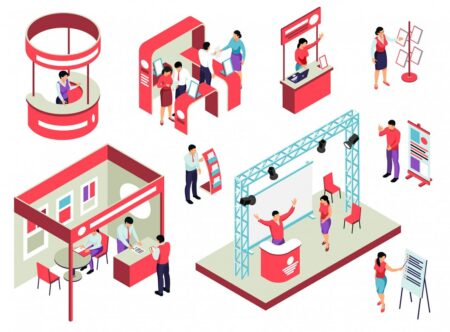
Venue inspection
Conduct a thorough walk-through of the venue to visualise the event flow and ensure all spaces are as envisioned.
Layout adjustments
Confirm the final layout, including seating arrangements, signage placements, and accessibility considerations.
Step 22: Final Technology and Equipment Checks
Tech rehearsals
Test all event tech and equipment, from audiovisuals to lighting, and connectivity to avoid any technical hiccups.
Equipment inventory
Double-check the availability and proper functioning of all necessary equipment.
Step 23: Emergency and Security Protocols Review
Safety run-through
Review and drill the emergency and evacuation procedures with your team and venue staff.
Security confirmation
Finalise security measures and brief security personnel on their roles and any special considerations.
Step 24: Participant and VIP Coordination
VIP management
Ensure all VIP requirements are catered for, from travel arrangements to special accommodations.
Participant readiness
Reach out to speakers, entertainers, and participants to confirm arrival times and any last-minute needs.
During the event: Real-time management and coordination
The event day has arrived, and your event planning checklist has evolved into a dynamic action plan. It’s now about real-time adjustments and proactive event management to ensure a memorable experience for all attendees.
Step 25: Registration and Check-In Processes

Smooth check-ins
Expedite guest check-in with Evenesis’ rapid 3-second facial recognition, ensuring a queue-free, efficient welcome that’s 15 times faster than manual methods.
Credential distribution
Distribute badges, programs, and swag bags, making sure each attendee receives the correct items.
Step 26: Overseeing Event Flow and Timings
Time management
Monitor the event schedule closely to maintain timely transitions and address any timing issues.
Flow supervision
Keep an eye on attendee movement and engagement, making adjustments as needed to optimise the experience.
Step 27: On-The-Spot Problem Solving and Decision-Making
Rapid response
Establish a quick-response team for unforeseen issues, ensuring minimal disruption to the event flow.
Decision authority
Empower team leads with the authority to make on-the-spot decisions, maintaining a smooth operation.
Step 28: Engaging with Attendees and VIPs
Active engagement
Interact with attendees to gauge their experience and gather immediate feedback.
VIP care
Provide continuous attention to VIPs and special guests, ensuring their expectations are exceeded.
Step 29: Social Media Updates and Live Engagement

Live updates
Share real-time highlights and key moments on social media to engage an online audience and promote the event’s vibrancy.
Audience interaction
Encourage online audience participation with live polls, Q&As, and interactive sessions.
Post-event: Wrapping up and looking ahead
Congratulations, your event was a success! But the work isn’t over yet. The post-event phase is critical for closing the loop on the current successful event and setting the stage for future victory.
Step 30: Post-Event Breakdown and Clean-Up Operations
Efficient dismantling
Oversee the breakdown of the event space, ensuring all equipment is returned and areas are left clean.
Rental returns
Manage the return of all rented items, from technology to furniture, to avoid late fees and maintain good vendor relationships.
Step 31: Gathering Feedback and Data for KPI Analysis

Feedback collection
Distribute surveys or hold debrief sessions with attendees to collect feedback on their experience.
Data review
Analyse event data against your KPIs to assess successes and areas for improvement.
Step 32: Thank-You Communications and Stakeholder Debriefing
Gratitude gesture
Send out thank-you notes to attendees, sponsors, and team members, acknowledging their part in the event’s success.
Stakeholder recap
Schedule debrief meetings with stakeholders to review outcomes and discuss the return on investment.
Step 33: Final Budget Reconciliation and Report Generation

Financial wrap-up
Reconcile the final budget, accounting for all expenses and revenues.
Report creation
Prepare comprehensive reports detailing the event’s outcomes, financials, and learnings for future reference.
Conclusion
In wrapping up, it’s crucial to acknowledge that a well-executed event is the product of detailed planning and organised project management. This event planning and management checklist serves as a roadmap to guide you through each phase, ensuring nothing is overlooked.
From initial concept to post-event analysis, adhering to a structured timeline facilitates a seamless experience. Remember, successful events don’t happen by chance—they are the result of foresight, strategy, and meticulous attention to detail, all of which are embodied in this comprehensive guide.

